Corporate Governance: Principles, Theories and Importance
VerifiedAdded on 2022/10/10
|7
|1920
|449
AI Summary
This article discusses the theoretical framework of corporate governance, including agency theory, stakeholder theory, and stewardship theory. It also highlights the importance of corporate governance in today's business world.
Contribute Materials
Your contribution can guide someone’s learning journey. Share your
documents today.
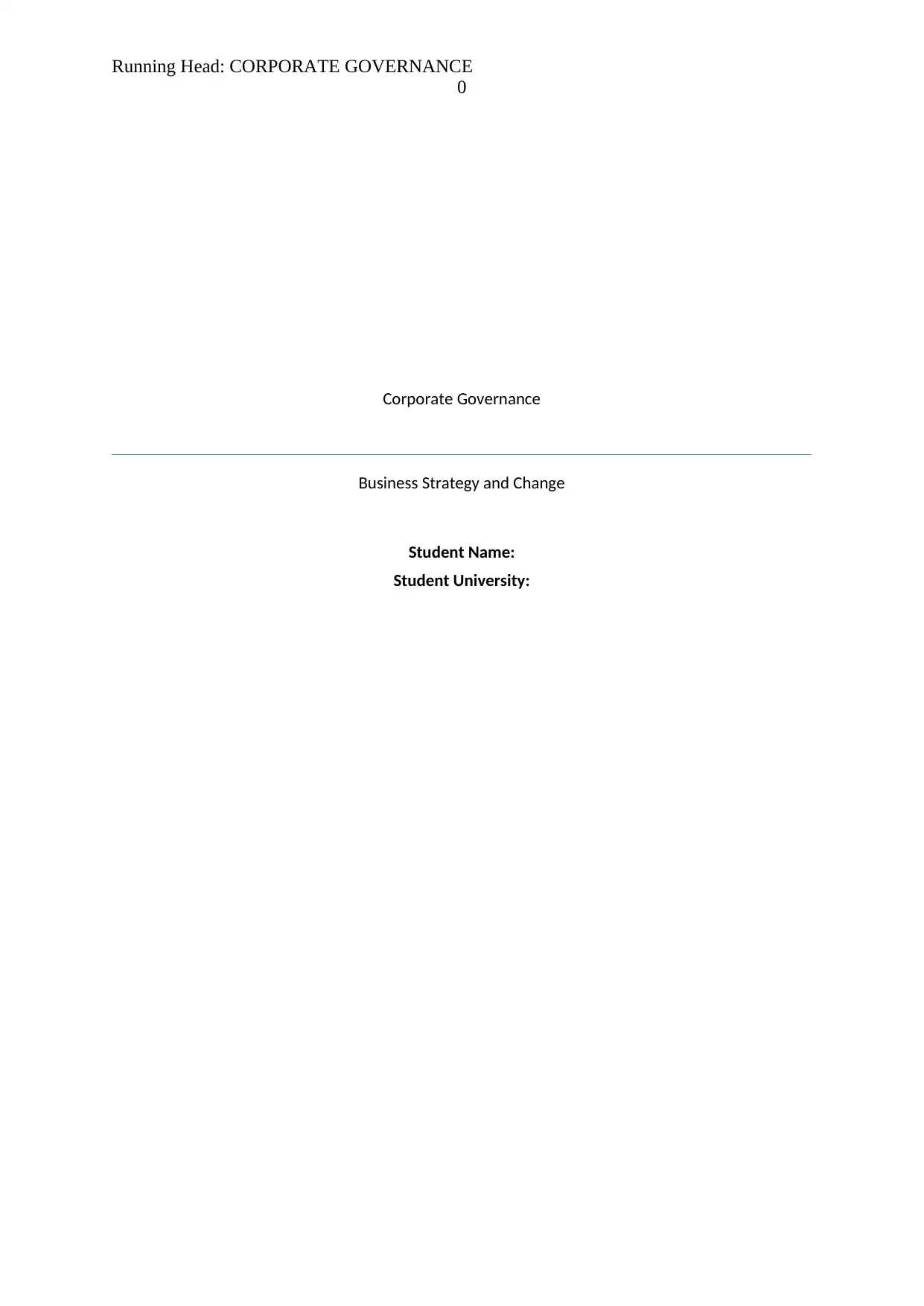
Running Head: CORPORATE GOVERNANCE
0
Corporate Governance
Business Strategy and Change
Student Name:
Student University:
0
Corporate Governance
Business Strategy and Change
Student Name:
Student University:
Secure Best Marks with AI Grader
Need help grading? Try our AI Grader for instant feedback on your assignments.
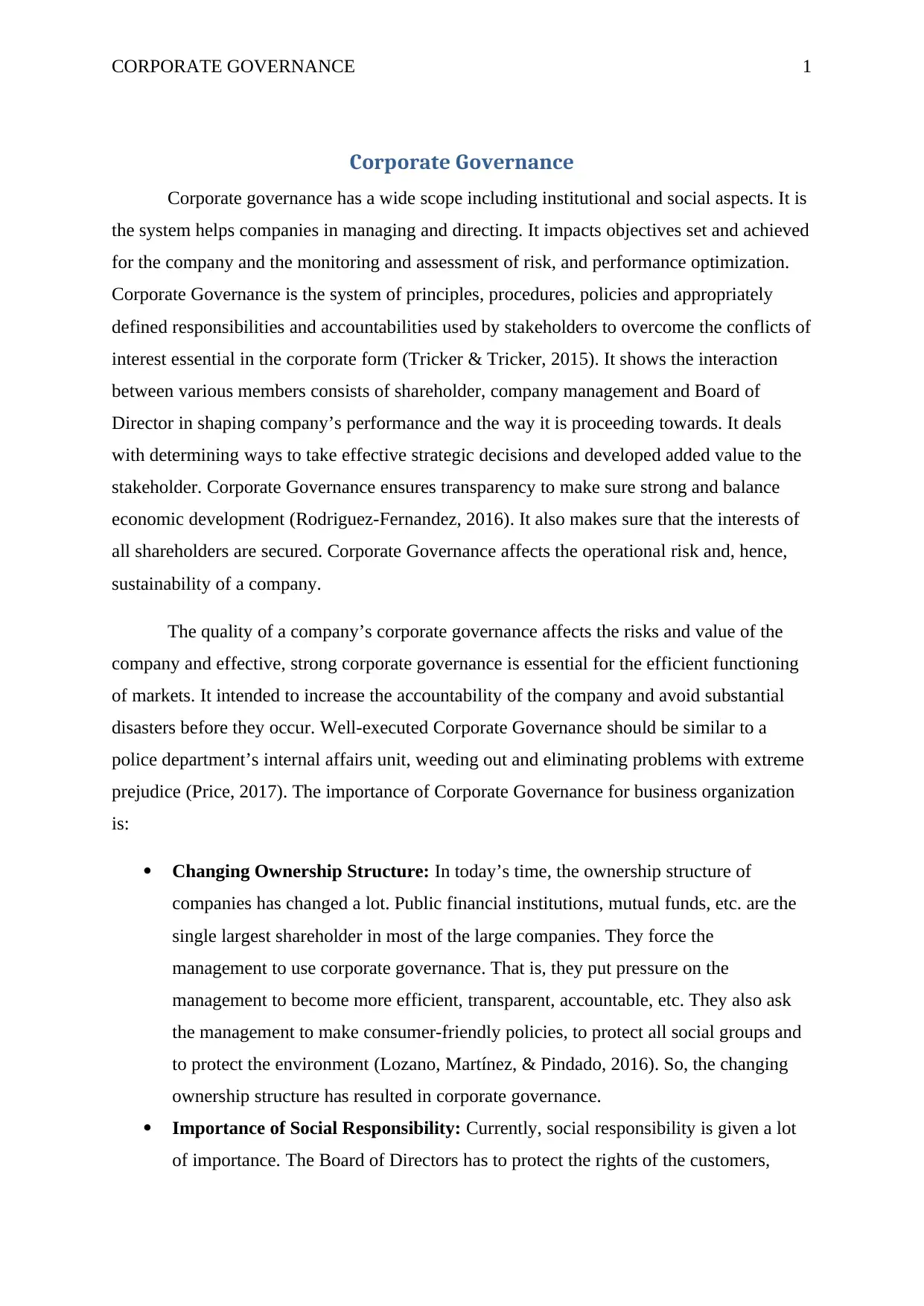
CORPORATE GOVERNANCE 1
Corporate Governance
Corporate governance has a wide scope including institutional and social aspects. It is
the system helps companies in managing and directing. It impacts objectives set and achieved
for the company and the monitoring and assessment of risk, and performance optimization.
Corporate Governance is the system of principles, procedures, policies and appropriately
defined responsibilities and accountabilities used by stakeholders to overcome the conflicts of
interest essential in the corporate form (Tricker & Tricker, 2015). It shows the interaction
between various members consists of shareholder, company management and Board of
Director in shaping company’s performance and the way it is proceeding towards. It deals
with determining ways to take effective strategic decisions and developed added value to the
stakeholder. Corporate Governance ensures transparency to make sure strong and balance
economic development (Rodriguez-Fernandez, 2016). It also makes sure that the interests of
all shareholders are secured. Corporate Governance affects the operational risk and, hence,
sustainability of a company.
The quality of a company’s corporate governance affects the risks and value of the
company and effective, strong corporate governance is essential for the efficient functioning
of markets. It intended to increase the accountability of the company and avoid substantial
disasters before they occur. Well-executed Corporate Governance should be similar to a
police department’s internal affairs unit, weeding out and eliminating problems with extreme
prejudice (Price, 2017). The importance of Corporate Governance for business organization
is:
Changing Ownership Structure: In today’s time, the ownership structure of
companies has changed a lot. Public financial institutions, mutual funds, etc. are the
single largest shareholder in most of the large companies. They force the
management to use corporate governance. That is, they put pressure on the
management to become more efficient, transparent, accountable, etc. They also ask
the management to make consumer-friendly policies, to protect all social groups and
to protect the environment (Lozano, Martínez, & Pindado, 2016). So, the changing
ownership structure has resulted in corporate governance.
Importance of Social Responsibility: Currently, social responsibility is given a lot
of importance. The Board of Directors has to protect the rights of the customers,
Corporate Governance
Corporate governance has a wide scope including institutional and social aspects. It is
the system helps companies in managing and directing. It impacts objectives set and achieved
for the company and the monitoring and assessment of risk, and performance optimization.
Corporate Governance is the system of principles, procedures, policies and appropriately
defined responsibilities and accountabilities used by stakeholders to overcome the conflicts of
interest essential in the corporate form (Tricker & Tricker, 2015). It shows the interaction
between various members consists of shareholder, company management and Board of
Director in shaping company’s performance and the way it is proceeding towards. It deals
with determining ways to take effective strategic decisions and developed added value to the
stakeholder. Corporate Governance ensures transparency to make sure strong and balance
economic development (Rodriguez-Fernandez, 2016). It also makes sure that the interests of
all shareholders are secured. Corporate Governance affects the operational risk and, hence,
sustainability of a company.
The quality of a company’s corporate governance affects the risks and value of the
company and effective, strong corporate governance is essential for the efficient functioning
of markets. It intended to increase the accountability of the company and avoid substantial
disasters before they occur. Well-executed Corporate Governance should be similar to a
police department’s internal affairs unit, weeding out and eliminating problems with extreme
prejudice (Price, 2017). The importance of Corporate Governance for business organization
is:
Changing Ownership Structure: In today’s time, the ownership structure of
companies has changed a lot. Public financial institutions, mutual funds, etc. are the
single largest shareholder in most of the large companies. They force the
management to use corporate governance. That is, they put pressure on the
management to become more efficient, transparent, accountable, etc. They also ask
the management to make consumer-friendly policies, to protect all social groups and
to protect the environment (Lozano, Martínez, & Pindado, 2016). So, the changing
ownership structure has resulted in corporate governance.
Importance of Social Responsibility: Currently, social responsibility is given a lot
of importance. The Board of Directors has to protect the rights of the customers,
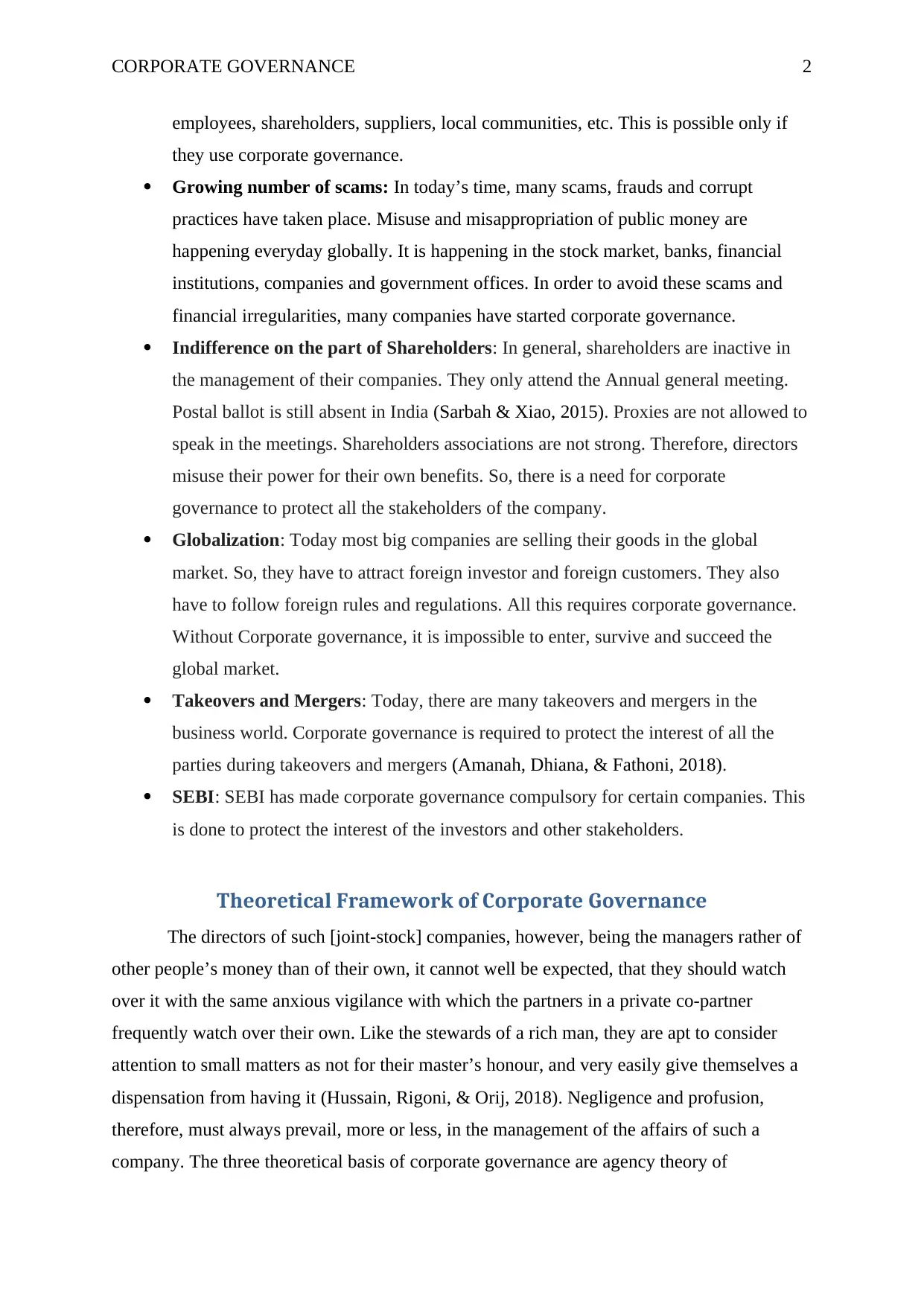
CORPORATE GOVERNANCE 2
employees, shareholders, suppliers, local communities, etc. This is possible only if
they use corporate governance.
Growing number of scams: In today’s time, many scams, frauds and corrupt
practices have taken place. Misuse and misappropriation of public money are
happening everyday globally. It is happening in the stock market, banks, financial
institutions, companies and government offices. In order to avoid these scams and
financial irregularities, many companies have started corporate governance.
Indifference on the part of Shareholders: In general, shareholders are inactive in
the management of their companies. They only attend the Annual general meeting.
Postal ballot is still absent in India (Sarbah & Xiao, 2015). Proxies are not allowed to
speak in the meetings. Shareholders associations are not strong. Therefore, directors
misuse their power for their own benefits. So, there is a need for corporate
governance to protect all the stakeholders of the company.
Globalization: Today most big companies are selling their goods in the global
market. So, they have to attract foreign investor and foreign customers. They also
have to follow foreign rules and regulations. All this requires corporate governance.
Without Corporate governance, it is impossible to enter, survive and succeed the
global market.
Takeovers and Mergers: Today, there are many takeovers and mergers in the
business world. Corporate governance is required to protect the interest of all the
parties during takeovers and mergers (Amanah, Dhiana, & Fathoni, 2018).
SEBI: SEBI has made corporate governance compulsory for certain companies. This
is done to protect the interest of the investors and other stakeholders.
Theoretical Framework of Corporate Governance
The directors of such [joint-stock] companies, however, being the managers rather of
other people’s money than of their own, it cannot well be expected, that they should watch
over it with the same anxious vigilance with which the partners in a private co-partner
frequently watch over their own. Like the stewards of a rich man, they are apt to consider
attention to small matters as not for their master’s honour, and very easily give themselves a
dispensation from having it (Hussain, Rigoni, & Orij, 2018). Negligence and profusion,
therefore, must always prevail, more or less, in the management of the affairs of such a
company. The three theoretical basis of corporate governance are agency theory of
employees, shareholders, suppliers, local communities, etc. This is possible only if
they use corporate governance.
Growing number of scams: In today’s time, many scams, frauds and corrupt
practices have taken place. Misuse and misappropriation of public money are
happening everyday globally. It is happening in the stock market, banks, financial
institutions, companies and government offices. In order to avoid these scams and
financial irregularities, many companies have started corporate governance.
Indifference on the part of Shareholders: In general, shareholders are inactive in
the management of their companies. They only attend the Annual general meeting.
Postal ballot is still absent in India (Sarbah & Xiao, 2015). Proxies are not allowed to
speak in the meetings. Shareholders associations are not strong. Therefore, directors
misuse their power for their own benefits. So, there is a need for corporate
governance to protect all the stakeholders of the company.
Globalization: Today most big companies are selling their goods in the global
market. So, they have to attract foreign investor and foreign customers. They also
have to follow foreign rules and regulations. All this requires corporate governance.
Without Corporate governance, it is impossible to enter, survive and succeed the
global market.
Takeovers and Mergers: Today, there are many takeovers and mergers in the
business world. Corporate governance is required to protect the interest of all the
parties during takeovers and mergers (Amanah, Dhiana, & Fathoni, 2018).
SEBI: SEBI has made corporate governance compulsory for certain companies. This
is done to protect the interest of the investors and other stakeholders.
Theoretical Framework of Corporate Governance
The directors of such [joint-stock] companies, however, being the managers rather of
other people’s money than of their own, it cannot well be expected, that they should watch
over it with the same anxious vigilance with which the partners in a private co-partner
frequently watch over their own. Like the stewards of a rich man, they are apt to consider
attention to small matters as not for their master’s honour, and very easily give themselves a
dispensation from having it (Hussain, Rigoni, & Orij, 2018). Negligence and profusion,
therefore, must always prevail, more or less, in the management of the affairs of such a
company. The three theoretical basis of corporate governance are agency theory of
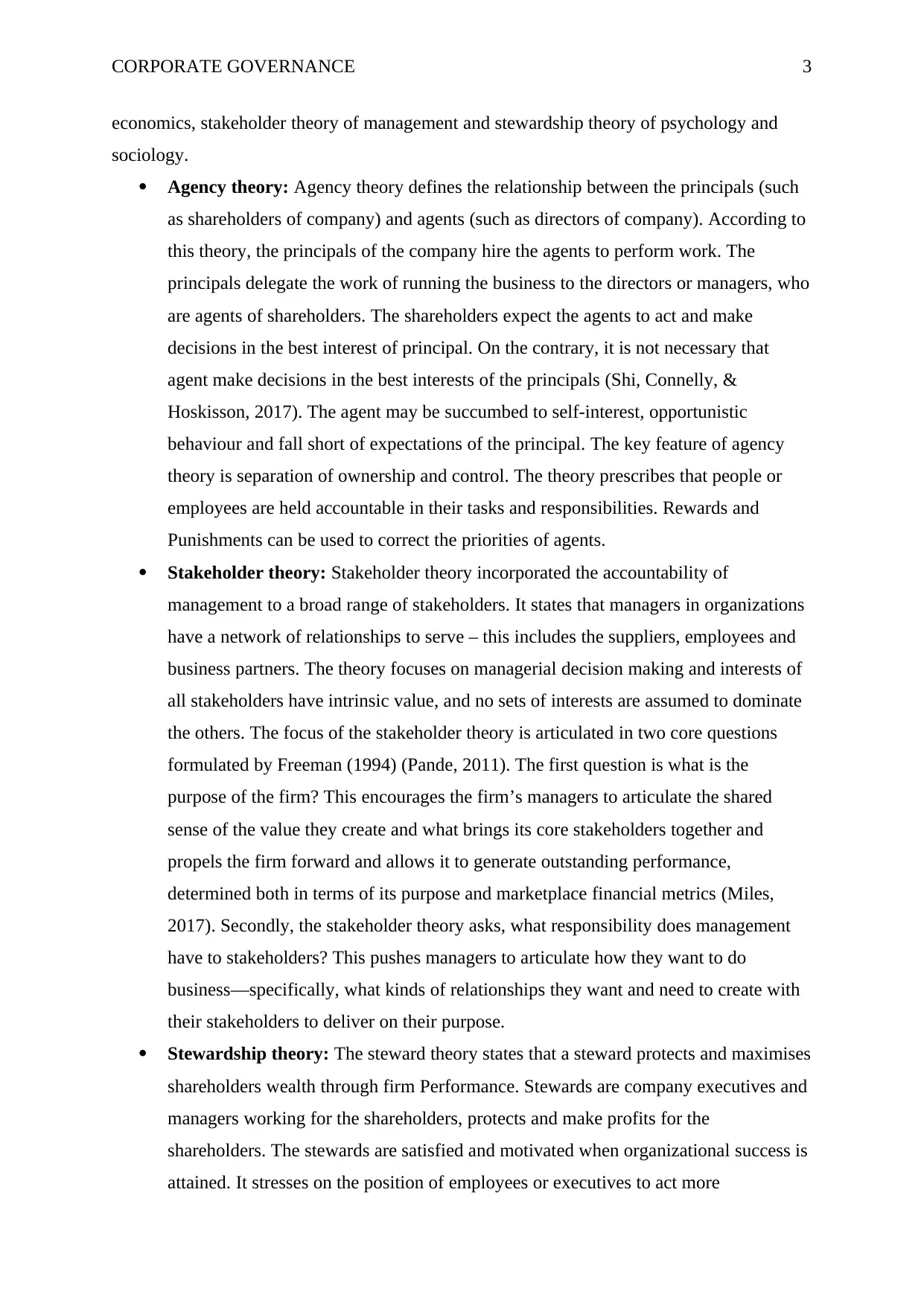
CORPORATE GOVERNANCE 3
economics, stakeholder theory of management and stewardship theory of psychology and
sociology.
Agency theory: Agency theory defines the relationship between the principals (such
as shareholders of company) and agents (such as directors of company). According to
this theory, the principals of the company hire the agents to perform work. The
principals delegate the work of running the business to the directors or managers, who
are agents of shareholders. The shareholders expect the agents to act and make
decisions in the best interest of principal. On the contrary, it is not necessary that
agent make decisions in the best interests of the principals (Shi, Connelly, &
Hoskisson, 2017). The agent may be succumbed to self-interest, opportunistic
behaviour and fall short of expectations of the principal. The key feature of agency
theory is separation of ownership and control. The theory prescribes that people or
employees are held accountable in their tasks and responsibilities. Rewards and
Punishments can be used to correct the priorities of agents.
Stakeholder theory: Stakeholder theory incorporated the accountability of
management to a broad range of stakeholders. It states that managers in organizations
have a network of relationships to serve – this includes the suppliers, employees and
business partners. The theory focuses on managerial decision making and interests of
all stakeholders have intrinsic value, and no sets of interests are assumed to dominate
the others. The focus of the stakeholder theory is articulated in two core questions
formulated by Freeman (1994) (Pande, 2011). The first question is what is the
purpose of the firm? This encourages the firm’s managers to articulate the shared
sense of the value they create and what brings its core stakeholders together and
propels the firm forward and allows it to generate outstanding performance,
determined both in terms of its purpose and marketplace financial metrics (Miles,
2017). Secondly, the stakeholder theory asks, what responsibility does management
have to stakeholders? This pushes managers to articulate how they want to do
business—specifically, what kinds of relationships they want and need to create with
their stakeholders to deliver on their purpose.
Stewardship theory: The steward theory states that a steward protects and maximises
shareholders wealth through firm Performance. Stewards are company executives and
managers working for the shareholders, protects and make profits for the
shareholders. The stewards are satisfied and motivated when organizational success is
attained. It stresses on the position of employees or executives to act more
economics, stakeholder theory of management and stewardship theory of psychology and
sociology.
Agency theory: Agency theory defines the relationship between the principals (such
as shareholders of company) and agents (such as directors of company). According to
this theory, the principals of the company hire the agents to perform work. The
principals delegate the work of running the business to the directors or managers, who
are agents of shareholders. The shareholders expect the agents to act and make
decisions in the best interest of principal. On the contrary, it is not necessary that
agent make decisions in the best interests of the principals (Shi, Connelly, &
Hoskisson, 2017). The agent may be succumbed to self-interest, opportunistic
behaviour and fall short of expectations of the principal. The key feature of agency
theory is separation of ownership and control. The theory prescribes that people or
employees are held accountable in their tasks and responsibilities. Rewards and
Punishments can be used to correct the priorities of agents.
Stakeholder theory: Stakeholder theory incorporated the accountability of
management to a broad range of stakeholders. It states that managers in organizations
have a network of relationships to serve – this includes the suppliers, employees and
business partners. The theory focuses on managerial decision making and interests of
all stakeholders have intrinsic value, and no sets of interests are assumed to dominate
the others. The focus of the stakeholder theory is articulated in two core questions
formulated by Freeman (1994) (Pande, 2011). The first question is what is the
purpose of the firm? This encourages the firm’s managers to articulate the shared
sense of the value they create and what brings its core stakeholders together and
propels the firm forward and allows it to generate outstanding performance,
determined both in terms of its purpose and marketplace financial metrics (Miles,
2017). Secondly, the stakeholder theory asks, what responsibility does management
have to stakeholders? This pushes managers to articulate how they want to do
business—specifically, what kinds of relationships they want and need to create with
their stakeholders to deliver on their purpose.
Stewardship theory: The steward theory states that a steward protects and maximises
shareholders wealth through firm Performance. Stewards are company executives and
managers working for the shareholders, protects and make profits for the
shareholders. The stewards are satisfied and motivated when organizational success is
attained. It stresses on the position of employees or executives to act more
Secure Best Marks with AI Grader
Need help grading? Try our AI Grader for instant feedback on your assignments.
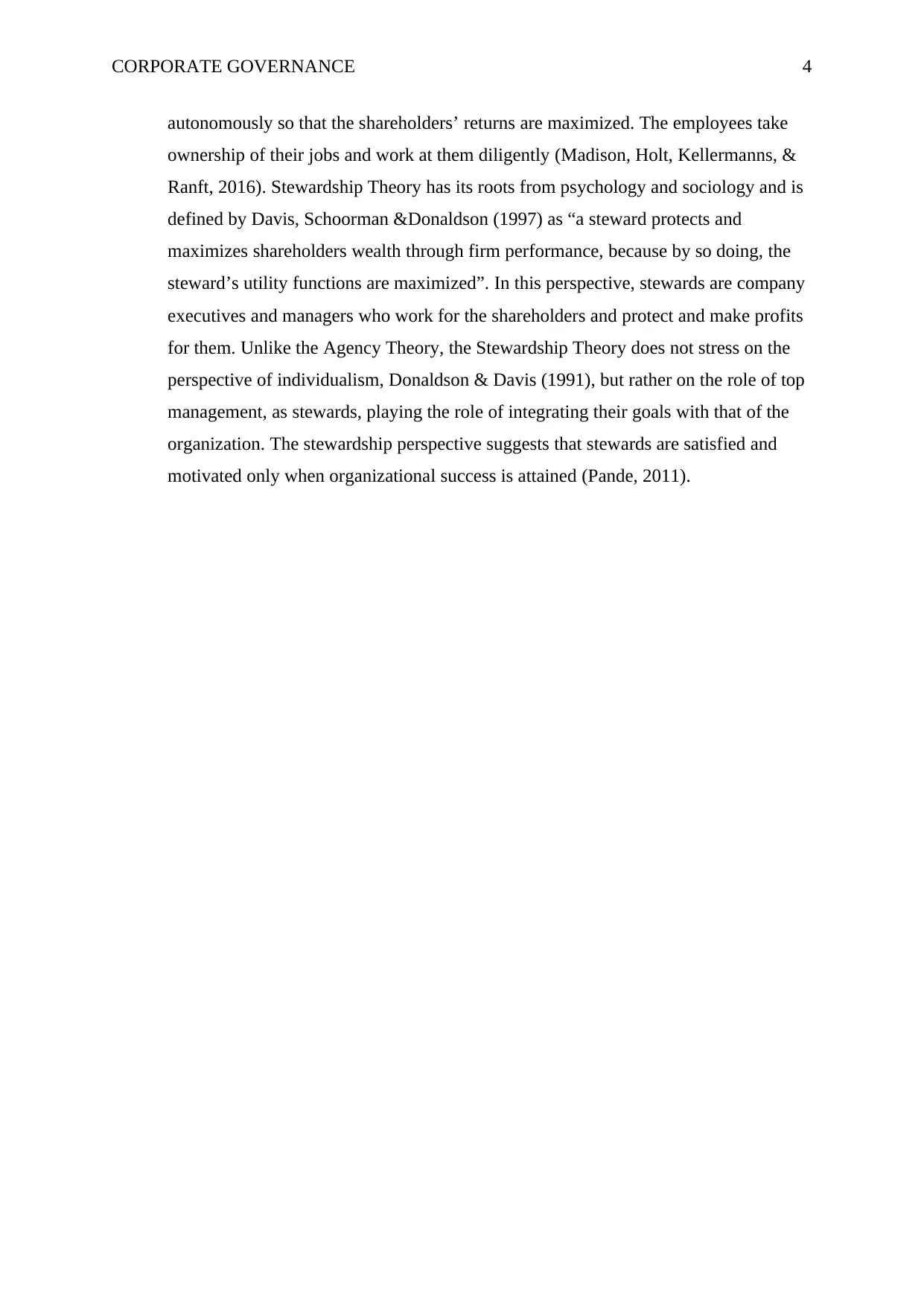
CORPORATE GOVERNANCE 4
autonomously so that the shareholders’ returns are maximized. The employees take
ownership of their jobs and work at them diligently (Madison, Holt, Kellermanns, &
Ranft, 2016). Stewardship Theory has its roots from psychology and sociology and is
defined by Davis, Schoorman &Donaldson (1997) as “a steward protects and
maximizes shareholders wealth through firm performance, because by so doing, the
steward’s utility functions are maximized”. In this perspective, stewards are company
executives and managers who work for the shareholders and protect and make profits
for them. Unlike the Agency Theory, the Stewardship Theory does not stress on the
perspective of individualism, Donaldson & Davis (1991), but rather on the role of top
management, as stewards, playing the role of integrating their goals with that of the
organization. The stewardship perspective suggests that stewards are satisfied and
motivated only when organizational success is attained (Pande, 2011).
autonomously so that the shareholders’ returns are maximized. The employees take
ownership of their jobs and work at them diligently (Madison, Holt, Kellermanns, &
Ranft, 2016). Stewardship Theory has its roots from psychology and sociology and is
defined by Davis, Schoorman &Donaldson (1997) as “a steward protects and
maximizes shareholders wealth through firm performance, because by so doing, the
steward’s utility functions are maximized”. In this perspective, stewards are company
executives and managers who work for the shareholders and protect and make profits
for them. Unlike the Agency Theory, the Stewardship Theory does not stress on the
perspective of individualism, Donaldson & Davis (1991), but rather on the role of top
management, as stewards, playing the role of integrating their goals with that of the
organization. The stewardship perspective suggests that stewards are satisfied and
motivated only when organizational success is attained (Pande, 2011).
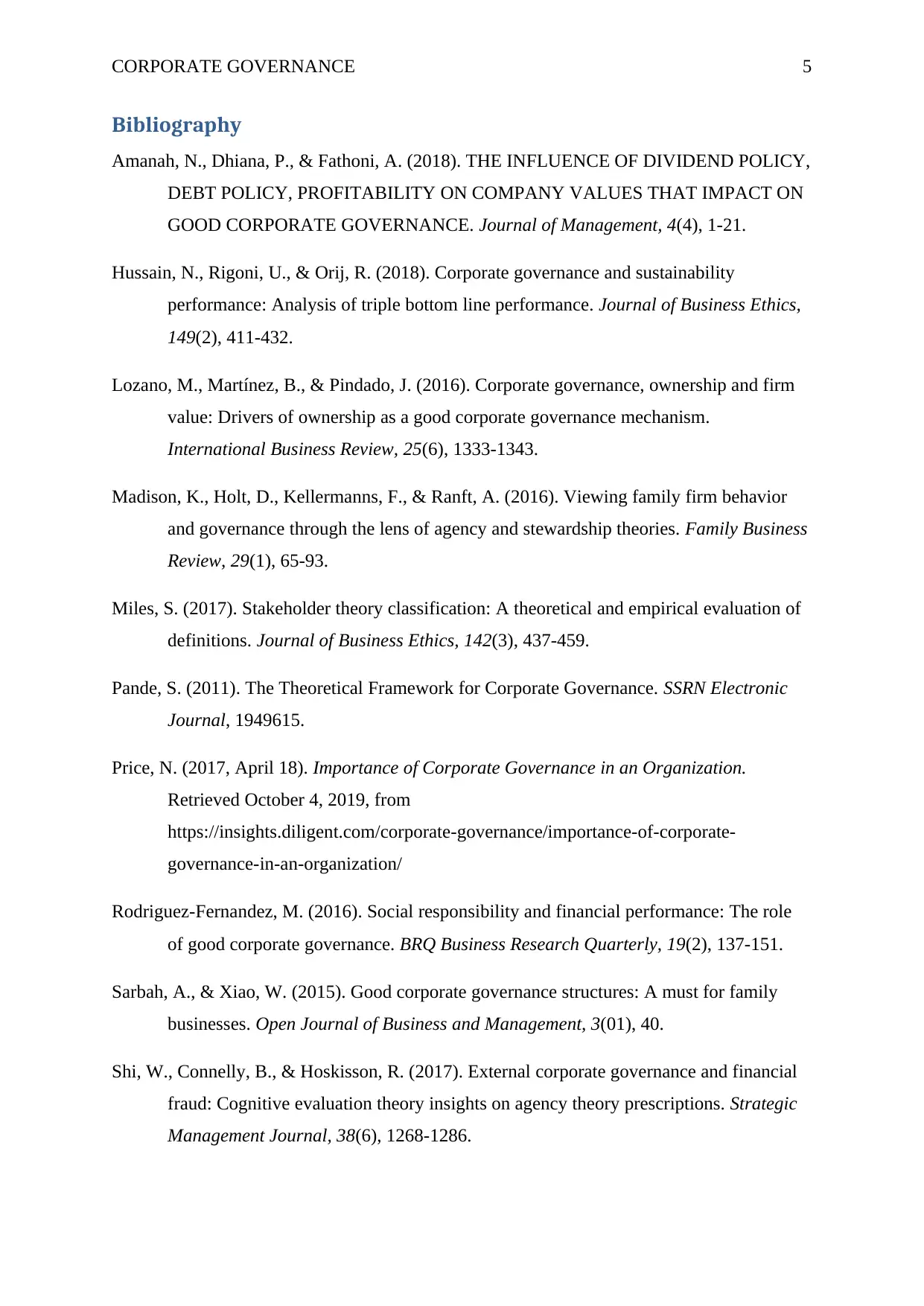
CORPORATE GOVERNANCE 5
Bibliography
Amanah, N., Dhiana, P., & Fathoni, A. (2018). THE INFLUENCE OF DIVIDEND POLICY,
DEBT POLICY, PROFITABILITY ON COMPANY VALUES THAT IMPACT ON
GOOD CORPORATE GOVERNANCE. Journal of Management, 4(4), 1-21.
Hussain, N., Rigoni, U., & Orij, R. (2018). Corporate governance and sustainability
performance: Analysis of triple bottom line performance. Journal of Business Ethics,
149(2), 411-432.
Lozano, M., Martínez, B., & Pindado, J. (2016). Corporate governance, ownership and firm
value: Drivers of ownership as a good corporate governance mechanism.
International Business Review, 25(6), 1333-1343.
Madison, K., Holt, D., Kellermanns, F., & Ranft, A. (2016). Viewing family firm behavior
and governance through the lens of agency and stewardship theories. Family Business
Review, 29(1), 65-93.
Miles, S. (2017). Stakeholder theory classification: A theoretical and empirical evaluation of
definitions. Journal of Business Ethics, 142(3), 437-459.
Pande, S. (2011). The Theoretical Framework for Corporate Governance. SSRN Electronic
Journal, 1949615.
Price, N. (2017, April 18). Importance of Corporate Governance in an Organization.
Retrieved October 4, 2019, from
https://insights.diligent.com/corporate-governance/importance-of-corporate-
governance-in-an-organization/
Rodriguez-Fernandez, M. (2016). Social responsibility and financial performance: The role
of good corporate governance. BRQ Business Research Quarterly, 19(2), 137-151.
Sarbah, A., & Xiao, W. (2015). Good corporate governance structures: A must for family
businesses. Open Journal of Business and Management, 3(01), 40.
Shi, W., Connelly, B., & Hoskisson, R. (2017). External corporate governance and financial
fraud: Cognitive evaluation theory insights on agency theory prescriptions. Strategic
Management Journal, 38(6), 1268-1286.
Bibliography
Amanah, N., Dhiana, P., & Fathoni, A. (2018). THE INFLUENCE OF DIVIDEND POLICY,
DEBT POLICY, PROFITABILITY ON COMPANY VALUES THAT IMPACT ON
GOOD CORPORATE GOVERNANCE. Journal of Management, 4(4), 1-21.
Hussain, N., Rigoni, U., & Orij, R. (2018). Corporate governance and sustainability
performance: Analysis of triple bottom line performance. Journal of Business Ethics,
149(2), 411-432.
Lozano, M., Martínez, B., & Pindado, J. (2016). Corporate governance, ownership and firm
value: Drivers of ownership as a good corporate governance mechanism.
International Business Review, 25(6), 1333-1343.
Madison, K., Holt, D., Kellermanns, F., & Ranft, A. (2016). Viewing family firm behavior
and governance through the lens of agency and stewardship theories. Family Business
Review, 29(1), 65-93.
Miles, S. (2017). Stakeholder theory classification: A theoretical and empirical evaluation of
definitions. Journal of Business Ethics, 142(3), 437-459.
Pande, S. (2011). The Theoretical Framework for Corporate Governance. SSRN Electronic
Journal, 1949615.
Price, N. (2017, April 18). Importance of Corporate Governance in an Organization.
Retrieved October 4, 2019, from
https://insights.diligent.com/corporate-governance/importance-of-corporate-
governance-in-an-organization/
Rodriguez-Fernandez, M. (2016). Social responsibility and financial performance: The role
of good corporate governance. BRQ Business Research Quarterly, 19(2), 137-151.
Sarbah, A., & Xiao, W. (2015). Good corporate governance structures: A must for family
businesses. Open Journal of Business and Management, 3(01), 40.
Shi, W., Connelly, B., & Hoskisson, R. (2017). External corporate governance and financial
fraud: Cognitive evaluation theory insights on agency theory prescriptions. Strategic
Management Journal, 38(6), 1268-1286.

CORPORATE GOVERNANCE 6
Tricker, R., & Tricker, R. (2015). Corporate Governance: Principles, Policies, and
Practices. England: Oxford University Press.
Tricker, R., & Tricker, R. (2015). Corporate Governance: Principles, Policies, and
Practices. England: Oxford University Press.
1 out of 7
Related Documents
Your All-in-One AI-Powered Toolkit for Academic Success.
+13062052269
info@desklib.com
Available 24*7 on WhatsApp / Email
![[object Object]](/_next/static/media/star-bottom.7253800d.svg)
Unlock your academic potential
© 2024 | Zucol Services PVT LTD | All rights reserved.





